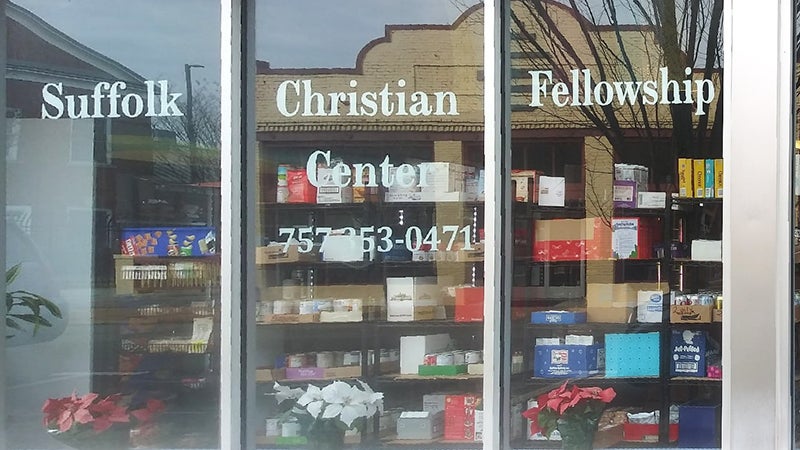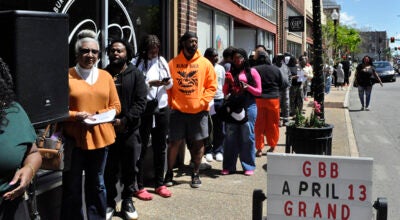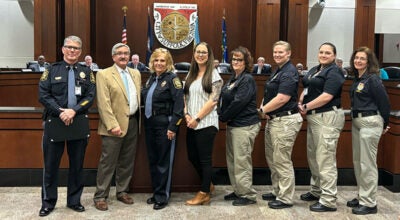SNAP extended benefits end; local groups prepare to fill need
Published 5:41 pm Tuesday, March 7, 2023

- Suffolk Christian Fellowship Center is another option for those in need at 211 E Washington Street. (Submitted by Lorna Slaughter)
|
Getting your Trinity Audio player ready...
|
With SNAP having ended additional pandemic benefits on March 1, local residents to ensure they have food to feed the family.
As such, many will look to the Salvation Army of Suffolk and Suffolk Christian Fellowship Center for assistance.
Located at 400 Bank Street, the Salvation Army of Suffolk provides daily food pantry sessions from 9:30 to 11:30 a.m. Monday through Friday, with afternoon sessions from 1-4 p.m. Monday, Wednesday and Friday.
The Soup Kitchen is open from 3 p.m. every Tuesday and Thursday and operates as a drive through.
Captain Angel Simmons, Corp Officer of the Salvation Army of Suffolk, discussed how they work to serve not only Suffolk, but the entire Western Tidewater area.
“Anyone in Suffolk, Surry, Isle of Wight, Franklin and Smithfield can come to this location for assistance with food,” Simmons said.
She also emphasized that there must be 30 days between food pantry visits. The Soup Kitchen, however, is available any day the service is offered.
“We also partner with the Food Bank, so every fourth Monday, people can come and that is in our gymnasium from 1:30 to 3:00 p.m. and they would get fresh foods, so like fresh vegetables and meats and stuff like that through the Food Bank,” Simmons said.
The Suffolk Christian Fellowship Center, located at 211 E. Washington St., also provides food security programs from 11:30 a.m. to 12:30 p.m. Monday, Tuesday, Thursday and Friday. Its food rescue program is open during operating days, with the Soup Kitchen open from 2 to 3 p.m. every Sunday. The emergency food program however requires a photo ID and visitors can only obtain food every 30 days.
Co-founder and Suffolk Christian Fellowship Center Chief Operating Officer Lorna Slaughter explained the “clients choice” aspect of the center — meaning that visitors are able to select available goods as if they are shopping.
“When our participants come in the door, one of the things that we are trying to assure them is that they have the opportunity to come in as if they were going into a grocery store based on the availability of the products that we have. They get to select through those products,” Slaughter said. “We are trying everything possible to make sure we have a variety of goods so that we will meet the nutritional needs of the family as a whole, and the individual as a whole.”
Slaughter said the swift shift in benefits may challenge families needing to sustain themselves.
“Because with the emergency allotment, families were able to really, really go into the stores and purchase enough goods that was sustaining the family,” she said. “There were a lot of people that I did not see coming into the doors regularly any longer because of that support.”
Now that that support has been removed, Slaughter said she wants families to be assured that coming into their doors, they have goods to meet those needs.
“We will do everything we can to make sure that there’s nutritional value and that people are coming in the door with their dignity and leaving out the door with that same dignity,” she said.
Slaughter also spoke about a program for working families.
“I really want families out there who are being affected by this, the working families, to understand that we have created a program called ‘Second Shift.’ The first Tuesday in every month, we are here from 5 to 6:30 p.m., because we want to be able to capture that group of people who may not be able to get to us during our day hours of distribution and we want to be able to create access for those working families as well,” Slaughter said.
She also noted that their mobile distributions are still going on with the Fellowship Center.
“Anytime people are interested in finding out when that is happening, they can check our website and our Facebook page because that also gives information that we may be in their neighborhood,” she said. “They just get into a car and drive into that neighborhood, there’s a drive through distribution and we have one coming up.”
No Kid Hungry Virginia is also providing options for parents affected by the change by encouraging families to fill out free school meal applications to help reduce food costs. Likewise, the Suffolk School Division is eligible for the Community Eligibility Provision, which allows free breakfast and lunch for students.
In an analysis by the National Bureau of Economic Research, free school meals help eligible families save $11 to $39 on their monthly grocery bills.
Sarah Steely, Virginia director of No Kid Hungry Campaign, explained how viable SNAP still is for families and their children despite the discontinuation of the pandemic benefits.
“The main thing I want to emphasize is that SNAP remains an important resource for families,” Steely said. “It is still one of the most effective ways that we can reach kids with the food that they need.”
Steely said it’s most important that families are aware of the upcoming changes so that they can make plans for their households.
“They can get their money together,” she said. “They can seek out other benefits where needed.”
Steely also provided the recommendation of being rescreened for SNAP benefits.
“If your household has experienced some sort of financial change such as rent going up or household income going down, if any of that has happened in the last two years, you should update your information with your local SNAP office so that individuals in households can be sure they are receiving all the benefits for which they are eligible,” she explained. “Just for some of the context there, the last few years have been chaotic and crazy. Some folks have been barely keeping their head above water and certainly the folks’ top of mind thing might not have been making sure that all of their information has been updated in the state system.”
Stepping back and making sure that the family is getting all its current information in the system is crucial so they are receiving all the benefits that they’re qualified for.
Finally, Steely emphasized there might be residents who aren’t receiving SNAP benefits who are in need.
“I don’t want folks to read this article and think ‘Well SNAP isn’t going to help me at all now.’ It’s still a very real resource,” she said. “The benefits won’t be as high as they were during the pandemic, during the time of the emergency allotment, but if you’re not currently receiving SNAP benefits and you think you might qualify, you should absolutely explore the program by reaching out to your local SNAP office”
For more information on these local food security resources, go to salvationarmypotomac.org/suffolk or scfc.online. For further assistance, go to 211virginia.org. For more information on CEP eligibility, go to fns.usda.gov/cn/community-eligibility-provision
For information on the NBER analysis, go to www.nber.org/papers/w29395.





